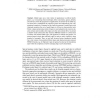Free Online Productivity Tools
i2Speak
i2Symbol
i2OCR
iTex2Img
iWeb2Print
iWeb2Shot
i2Type
iPdf2Split
iPdf2Merge
i2Bopomofo
i2Arabic
i2Style
i2Image
i2PDF
iLatex2Rtf
Sci2ools
121
click to vote
KI
2008
Springer
2008
Springer
Shallow Models for Non-iterative Modal Logics
Abstract. Modal logics see a wide variety of applications in artificial intelligence, e.g. in reasoning about knowledge, belief, uncertainty, agency, defaults, and relevance. From the perspective of applications, the attractivity of modal logics stems from a combination of expressive power and comparatively low computational complexity. Compared to the classical treatment of modal logics with relational semantics, the use of modal logics in AI has two characteristic traits: Firstly, a large and growing variety of logics is used, adapted to the concrete situation at hand, and secondly, these logics are often non-normal. Here, we present a shallow model construction that witnesses PSPACE bounds for a broad class of mostly non-normal modal logics. Our approach is uniform and generic: we present general criteria that uniformly apply to and are easily checked in large numbers of examples. Thus, we not only re-prove known complexity bounds for a wide variety of structurally different logics ...
| Added | 13 Dec 2010 |
| Updated | 13 Dec 2010 |
| Type | Journal |
| Year | 2008 |
| Where | KI |
| Authors | Lutz Schröder, Dirk Pattinson |
Comments (0)

